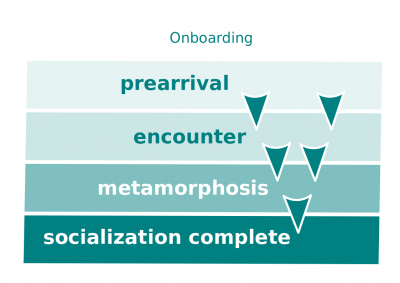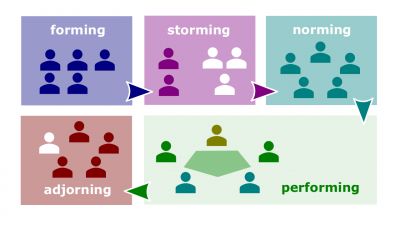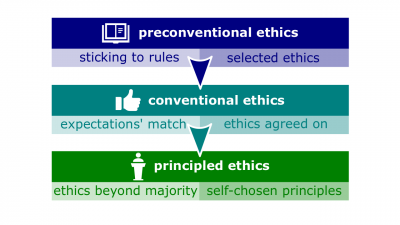Difference between revisions of "Learning sequence"
(→Cognitive development) |
(→Cognitive development) |
||
| Line 6: | Line 6: | ||
#Integrating a new employee into an organization including helping this employee to adapt to the organization's culture (this process is more specifically known as [[organizational socialization]], [[socialization process]], or, simply, [[socialization]]); or | #Integrating a new employee into an organization including helping this employee to adapt to the organization's culture (this process is more specifically known as [[organizational socialization]], [[socialization process]], or, simply, [[socialization]]); or | ||
#Familiarizing a new customer or client with one's products or services. | #Familiarizing a new customer or client with one's products or services. | ||
| + | |||
| + | ==Group development== | ||
| + | [[File:Group-development.png|400px|thumb|right|[[Group development]]]][[Group development]] (alternatively known as [[team development]]; hereinafter, the ''Development'') is the [[learning model]] that depicts the [[process]] of developing a [[group]]. | ||
| + | #[[Forming stage]]. The first stage of [[group development]] in which people join the group and then define the group's purpose, structure, and leadership. | ||
| + | #[[Storming stage]]. The second stage of [[group development]], characterized by [[intragroup conflict]]. | ||
| + | #[[Norming stage]]. The third stage of [[group development]], characterized by close relationships and cohesiveness. | ||
| + | #[[Performing stage]]. The fourth stage of [[group development]] when the group is fully functional and works on group task. | ||
| + | #[[Adjourning stage]]. The fifth stage of [[group development]] for temporary groups during which group members are concerned with wrapping up activities rather than task performance. | ||
==Cognitive development== | ==Cognitive development== | ||
Revision as of 12:55, 18 December 2019
A learning model (hereinafter, the Model) is any model that conceptualizes the process of one's learning.
Contents
Onboarding
Onboarding (hereinafter, the Process) is the process and/or the learning model that depicts that process of either:
- Integrating a new employee into an organization including helping this employee to adapt to the organization's culture (this process is more specifically known as organizational socialization, socialization process, or, simply, socialization); or
- Familiarizing a new customer or client with one's products or services.
Group development
Group development (alternatively known as team development; hereinafter, the Development) is the learning model that depicts the process of developing a group.
- Forming stage. The first stage of group development in which people join the group and then define the group's purpose, structure, and leadership.
- Storming stage. The second stage of group development, characterized by intragroup conflict.
- Norming stage. The third stage of group development, characterized by close relationships and cohesiveness.
- Performing stage. The fourth stage of group development when the group is fully functional and works on group task.
- Adjourning stage. The fifth stage of group development for temporary groups during which group members are concerned with wrapping up activities rather than task performance.
Cognitive development
Those Models that emphasize learning through cognition are known as cognitive development. The Piaget's theory of cognitive development (alternatively known as theory of cognitive development and partially known as mental-model development) is probably still the most popular among those models.
Theories
Sociocultural theory
Piaget vs Vygotsky
Related concepts
- Artificial neural network (ANN). The Model based on the biological neural networks present in the brains of animals. Based on the activity of neurons, ANNs are used to solve tasks that would be too difficult for traditional methods of programming.
- Social learning. The process of learning from the others.
See also
- https://www.simplypsychology.org/vygotsky.html
- https://yandex.ru/images/search?text=learning%20piaget&stype=image&lr=87&source=wiz&pos=2&img_url=https%3A%2F%2Fpryncepality.com%2Fwp-content%2Fuploads%2F2019%2F05%2Fpiaget-cognitive-development-chart-fresh-myers-psychology-7th-ed-ppt-of-piaget-cognitive-development-chart.jpg&rpt=simage
- http://www2.education.uiowa.edu/html/eportfolio/tep/07p075folder/Piaget_Vygotsky.htm
- https://www.funderstanding.com/educators/piaget/
- https://www.verywellmind.com/piagets-stages-of-cognitive-development-2795457
- https://www.simplypsychology.org/piaget.html
- https://exploringyourmind.com/piaget-and-his-theory-about-learning/
- https://www.academypublication.com/issues/past/jltr/vol02/04/01.pdf
- https://yandex.ru/images/search?text=learning%20model&stype=image&lr=87&source=wiz
- https://en.wikipedia.org/wiki/Action_model_learning
- https://www.teachthought.com/learning/learning-models-learning-theories-index/


